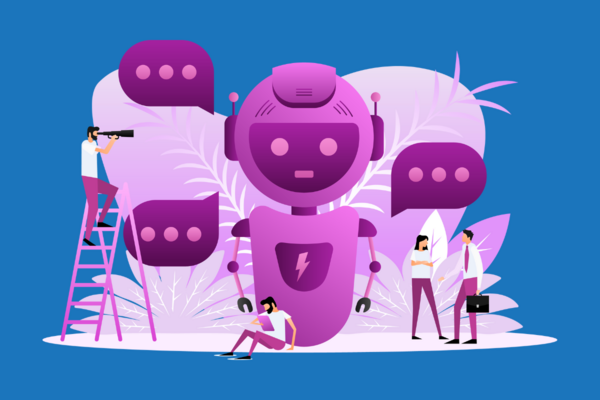To many, artificial intelligence (AI) is seen as a threat, but is it really?
AI refers to the ability of machines to perform tasks that would typically require human intelligence, such as learning, problem-solving and decision-making. It is a rapidly growing field of computer science that focuses on creating intelligent machines that can think and act like humans. AI has been around for decades, but recent advances in technology have made it more accessible than ever before.
AI systems are designed to learn from their environment, analyse data, and make decisions without human intervention. And AI can be used for a wide range of tasks, from playing games to driving cars.
AI is expected to reach “expert level” within twelve months. Microsoft is currently integrating AI into its platform such as Power Automate, Power BI and ChatGPT, so it is important we understand how this will change the workplace environment.
Key benefits of embracing AI
The general benefit of artificial intelligence, or AI, is that it replicates decisions and actions of humans without human shortcomings, such as fatigue, emotion, and limited time. Machines driven by AI technology can perform consistent, repetitious actions without getting tired. It is also easier for companies to get consistent performance across multiple AI machines than it is across multiple human workers.
If you ask an AI programme to explain how AI is changing the workplace, it will summarise the benefits as:
- Automation: AI powered automation is replacing repetitive and mundane tasks, enabling employees to focus on more complex and creative work.
- Decision-making support: AI systems can process vast amounts of data and provide valuable insights, aiding the decision-making process by analysing data patterns and trends.
- Enhanced productivity: AI technologies such as chatbots, virtual assistants and workflow optimisation tools improve productivity by streaming workflows, managing schedules, and offering real-time assistance.
- Personalised experiences: AI enables organisations to deliver personalised experiences to customers and employees, by leveraging machine learning algorithms. AI systems can analyse user preferences, behaviour and historical data to provide tailored recommendations, customised marketing campaigns and personalised learning experiences.
- Augmented creativity: AI tools are empowering employees by augmenting their creativity and problem-solving skills. AI algorithms can generate ideas, suggest design improvements, and assist in product development.
- Improved customer service: AI powered chatbots and virtual assistants are being used to enhance customer service experiences. They can provide instant responses to frequently asked questions, resolve basic customer issues and direct complex queries to human agents.
- Workplace upskilling: As AI technology evolves, there is a growing need for upskilling and reskilling the workforce. Organisations are investing in training programmes to equip employees with the necessary skills to work alongside AI systems effectively. Soft skills or “people skills”, which include good communication and interpersonal skills, together with effective leadership and teamwork become even more important.
- Ethical considerations: The integration of AI in the workplace raises ethical considerations related to privacy, bias, and accountability. Organisations need to establish guidelines and policies to ensure ethical and responsible AI use, addressing such issues as data privacy, algorithmic fairness, and transparency.
Would you like to discuss this topic more?
Contact Us
The initial impact on the workplace
The most likely immediate changes will be the transition of human roles from labour intensive processes to finishing off a project and communicating options and outcomes to other humans.
Perhaps the most important consequence is that AI can help you stay ahead of the competition, providing a competitive edge in optimising your processes and operations by gaining insights into market trends. You should be able to make more informed decisions utilising the information AI can provide, to respond promptly to changing market conditions.
The Hays Salary Guide FY23/24 points out that organisations must decide whether to simply survive or thrive. They explain that the workplace is changing fast and organisations that can keep pace will be best placed to gain a competitive edge.
Hays also points out that upskilling is imperative and critical to “future proofing” your organisation and that 88% of employers report that they are experiencing skills shortages. These shortages are impacting on productivity, the workloads of existing staff and project delivery. Added to these is a shortage in the number of people with the necessary qualifications, experience or communication skills, together with increased competition from other employers.
And Goldman Sachs has reported that roughly two thirds, or 300 million, of all jobs in the United States and Europe will be exposed to some degree of automation. New Zealand and Australia must adapt to these changing workplace conditions to remain competitive.
So, what strategies should management implement to meet the challenge of AI?
Almost all commentators emphasise the need to embrace and understand the changes that AI will bring and foster an AI-friendly culture, understanding the importance of ensuring teams are provided with the right skills, at the right time, to remain competitive.
This means that management needs to focus on upskilling their workforce, identify AI uses within their industry and adopt a data-driven approach.
This also means that it will almost certainly lead to partnering or working with AI experts – consultants who can help with the development of AI solutions tailored to the specific business needs of the company.
This will inevitably lead to the need to re-evaluate workforce strategies by identifying roles that can be enhanced by AI and reskill employees who will need to focus more on human skills or soft skills, understanding how people behave in pressure situations, what motivates them, what they prefer to avoid, their “development areas” and their natural strengths, together with their preferred communication styles.
Get Started with Extended DISC® Assessments Today
Get in touch
The Importance of Psychometric Assessment
The changing AI environment relies on people to drive innovation, address ethical concerns, provide critical input, interpret results, collaborate with AI, and make responsible decisions. Human involvement is necessary to ensure that AI technology benefits society and remains aligned with human values and aspirations.
Understanding the fundamentals of human behaviour becomes even more important as whatever changes are implemented, there will still be an increasing need for people to understand human behaviour, how individuals react under pressure, and as already mentioned, what motivates them, what they would prefer to avoid, their natural strengths and where they might require support.
Extended DISC® assessments provide this information and much more. The advanced online platform, FinxS, that powers Extended DISC® not only delivers reports within minutes 24/7, but enables managers and consultants to design focused reports that can be industry specific. FinxS provides access to over 1500 different competencies enabling users to select those competencies that are relevant to specific roles.
Because Extended DISC® identifies natural unconscious behaviour and adjusted conscious behaviour (behaviour the individual feels they need to adopt to cope with their environment…) emotional issues, such as pressure, stress, frustration, uncertainty of role and more, can be identified.
Added to this, Extended DISC® goes more deeply into understanding an individual’s behavioural style as it identifies and reports on 160 different styles – many more than any other behavioural assessments.
There is also a need to consider the importance of human resource professionals trained in working with change. Again, there is a range of Extended DISC® products that are available to provide information vital to effective people management.
In summary….
AI is with us now – proactively adapting business strategies that foster a culture of innovation, and training people to fit into this new environment, are crucial to remaining competitive in an evolving landscape.




